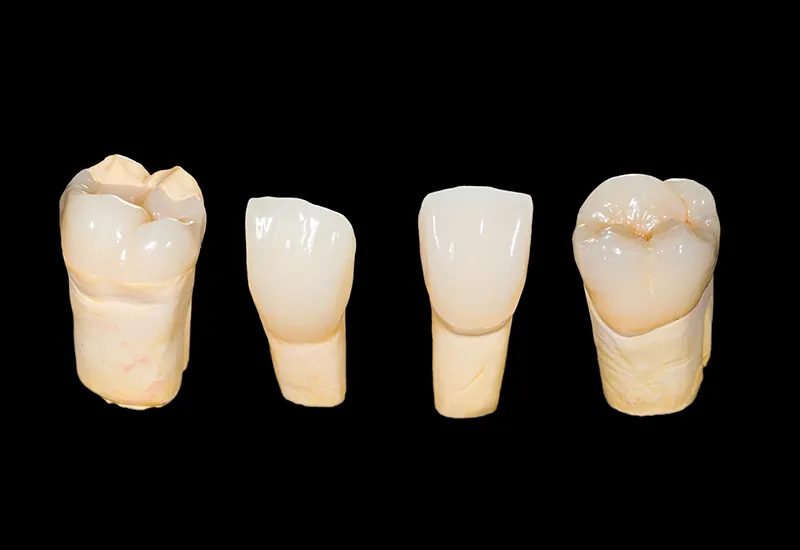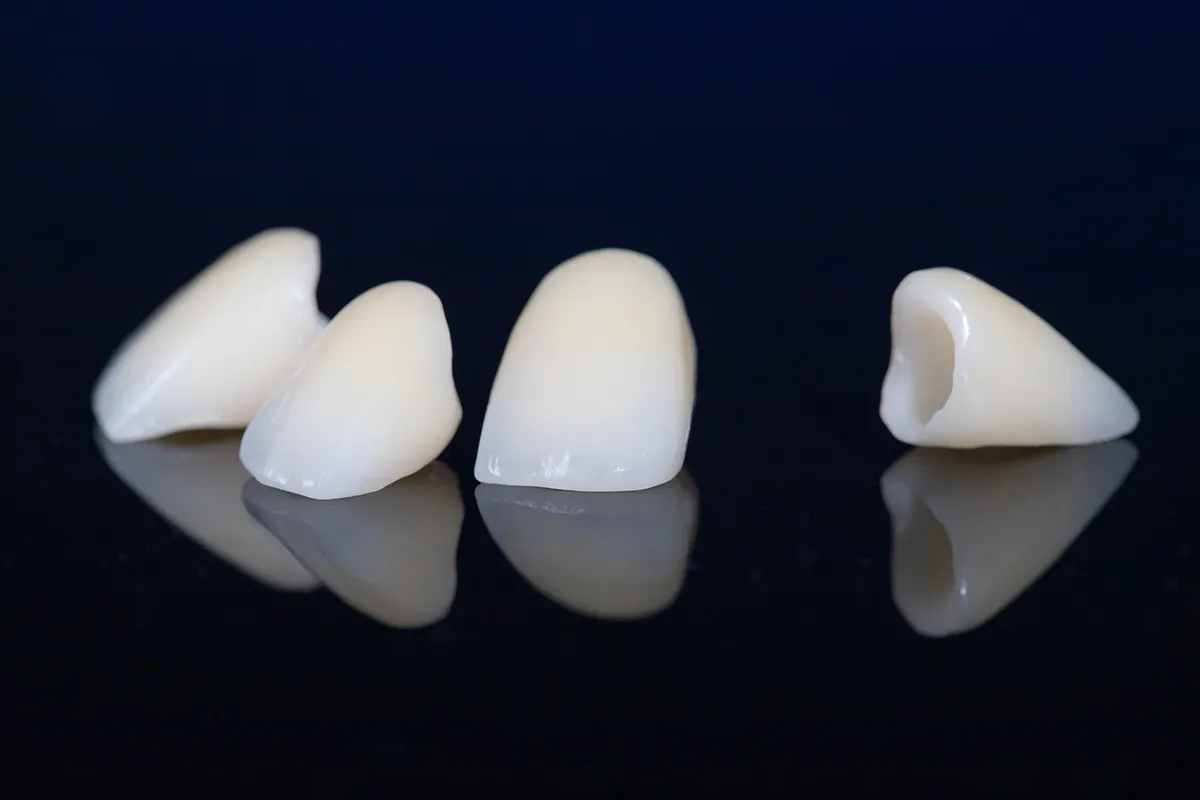How dental crowns perfect, protect, and transform smiles
Imagine a solution that restores the natural beauty of your damaged tooth while reinforcing its strength and function—this is the proven power of dental crowns. Trusted and versatile, crowns do more than improve your smile’s appearance; they protect and preserve your teeth, ensuring both durability and function. Whether dealing with a chip, decay, or a weakened tooth, a custom dental crown offers a seamless, comfortable, and long-lasting way to keep your smile healthy and radiant for years to come.
A crown fit for your smile
A dental crown, often called a “cap,” restores a damaged, decayed, or weakened tooth, bringing back the strength it deserves. Think of it as a coronation for your tooth—though gold isn’t your only option. Modern crowns blend seamlessly with natural teeth, restoring strength, beauty, and confidence so you can chew, smile, and speak with ease once again.

When are dental crowns necessary?
Dental crowns are an effective restorative option, providing protection, restoration, and aesthetic improvement for damaged or weakened teeth. Dentists may recommend crowns for several reasons:
Tooth decay: When decay has created a cavity too large for a filling, a crown can cover and restore the tooth, preventing further decay and adding much-needed structural support.
Cracked or chipped teeth: Fractures, chips, or significant wear can weaken teeth, increasing their vulnerability to additional damage. Crowns shield these teeth from stress, restoring strength and normal function.
Weak or worn teeth: Teeth which are worn down due to habits like grinding (bruxism) or weakened by repeated procedures, such as large fillings or root canals, benefit from crowns. They reinforce the tooth structure, reducing the likelihood of fractures.
Cosmetic purposes: Crowns can improve the appearance of teeth that are discoloured, misshapen, or uneven, significantly enhancing a smile’s symmetry and aesthetic appeal. They are particularly useful when other cosmetic treatments, like veneers or bonding, may not provide enough coverage or durability.
Restoration of dental implants: Crowns are commonly used to top dental implants, providing a natural-looking, functional replacement for missing teeth. They act as the visible portion of the implant, completing the restoration and allowing for normal chewing and speech.
Protection after root canal therapy: Following a root canal, the affected tooth is often more fragile. A crown covers and protects it, reducing the risk of future breakage or re-infection.
Bridges and missing teeth: When used in dental bridges, crowns anchor the bridge to adjacent teeth, filling gaps left by missing teeth. This not only restores appearance but also helps prevent neighbouring teeth from shifting out of alignment.

Correction of bite and alignment issues: Crowns can help correct minor bite issues or alignment concerns by reshaping a tooth, which can improve overall comfort and prevent excessive wear on other teeth.
Explore the range of dental crowns
Dental crowns come in various types, each with specific benefits. Your dentist will recommend the best option based on your dental health, lifestyle, and personal preferences. Here’s a breakdown of the most common types:

All-ceramic crowns: Made entirely of ceramic or porcelain, these crowns offer a highly natural appearance that closely mimics the colour and translucency of natural teeth. They are strong, biocompatible, and stain-resistant, making them a popular choice for visible front teeth or patients who prioritise aesthetics and metal-free options.
Composite resin crowns: Often used as a temporary solution, composite resin crowns are more affordable and can be colour-matched to blend with your natural teeth. However, they are not as durable as other crown materials and may be more susceptible to wear and discolouration over time, making them less ideal for long-term use.
3D printed crowns: Leveraging digital impressions and computer-aided design, 3D-printed crowns are created with high precision and can be made from high-performance resin materials. These crowns allow for efficient, same-day production, and precise customisation to match your bite and appearance, offering a comfortable fit and reliable durability.
Metal crowns: Crafted from gold, platinum, or other metal alloys, metal crowns are exceptionally durable and resistant to wear. They are typically used on molars due to their strength and ability to withstand strong chewing forces. However, they are less commonly chosen today because of their metallic colour and potential for some health concerns.
Temporary crowns: Often made from acrylic or composite resin, temporary crowns are used to protect a prepared tooth while a permanent crown is being fabricated. They allow you to chew and speak normally and protect your tooth from sensitivity or damage until your permanent crown is ready.
Complete guide to dental crown procedures
The process of getting a dental crown typically spans two appointments and involves several important steps to ensure a comfortable fit and a natural look. Here’s what you can expect:

Consultation and examination: Your dentist will start by thoroughly examining the affected tooth, possibly taking X-rays to assess its roots and surrounding bone. They’ll discuss your options and explain how a crown can meet your specific needs, ensuring it’s the best choice for your dental health and desired outcome.
Tooth preparation: To create space for the crown, your dentist will carefully shape the tooth by removing any damaged or decayed areas. In cases where the tooth lacks sufficient structure, they may place a foundation or “buildup” for additional support, which helps the crown sit securely.
Impression taking: To achieve a precise fit, your dentist will take an impression or digital scan of the prepared tooth. Many clinics use advanced intraoral scanners, allowing for highly accurate digital impressions without the need for traditional moulds, resulting in a quicker, more comfortable process.
Virtual smile simulation: Using advanced smile design software, your dentist may provide a real-time virtual simulation of your new smile. This lets you preview the anticipated result, giving you peace of mind and confidence in your decision backed by precise digital modelling.
Temporary crown placement: A temporary crown will be placed to protect your tooth while the permanent crown is crafted. This allows you to chew and speak normally and shields the tooth from sensitivity or further damage. If the clinic has in-house milling or 3D printing technology, the permanent crown may even be created on-site, potentially reducing wait time.
Permanent crown placement: During your final visit, your dentist will remove the temporary crown and fit the permanent one, making any necessary adjustments to ensure it aligns comfortably with your bite. After checking for a precise fit and natural look, they’ll secure the crown with dental cement, giving you a strong, beautiful restoration.
This process, guided by advanced technology and expert care, ensures your new crown will feel comfortable, look natural, and provide long-lasting protection for your tooth.
What to do after your tooth’s ‘coronation’
Taking proper care of your dental crown can help ensure it remains durable and functional for many long years. Here are some key aftercare tips:
Oral hygiene: Maintain your regular brushing and flossing routine, paying close attention to the area around the crown and your gumline. Use a soft-bristled toothbrush and non-abrasive toothpaste to prevent wear on the crown’s surface, and consider using floss designed for dental work or a floss threader to reach under the crown edges for thorough cleaning.

Diet considerations: While crowns are durable, it’s best to avoid biting down on very hard foods, such as hard candies, nuts, or ice, as these can chip or crack the crown. Sticky foods, like caramel or taffy, should be limited, as they can dislodge or loosen the crown over time. Opt for softer, less sticky alternatives to prolong the crown’s life.
Regular dental checkups: Schedule regular dental visits for check-ups and cleanings to allow your dentist to monitor the crown’s condition. During these visits, your dentist can spot early signs of wear, loosening, or other potential issues, helping prevent more extensive or costly repairs down the line.
Dental crown FAQs
How long does a dental crown last?
With good oral hygiene and regular dental visits, a dental crown can last anywhere from 5 to 15 years, and in some cases, even longer. The lifespan of a crown depends on factors like the crown material, the position of the crown in your mouth, and daily habits like grinding or clenching. Consistent care is key to maximising your crown’s longevity.
Is getting a dental crown painful?
Most patients experience minimal discomfort during the crown procedure, as it’s typically performed under local anaesthesia to numb the area. After the anaesthesia wears off, it’s normal to feel some mild sensitivity or soreness, which generally subsides within a few days. Your dentist may recommend over-the-counter pain relief if needed.
How much does a dental crown cost?
The cost of a dental crown varies based on factors like the type of material used (porcelain, ceramic, milled, or printed), the complexity of the case, and the location of your dental clinic. If you have advanced or extras cover, your private health fund may cover a percentage or set amount of the cost. For clarity on your coverage, consider reaching out to your health fund provider. Your dentist can also provide a personalised estimate and help you understand your insurance coverage options.
What are the risks of dental crowns?
Dental crowns are a safe and effective treatment, but there are a few potential risks. Some patients may experience temporary sensitivity to temperature changes or pressure. Crowns can occasionally loosen if the cement wears down over time. In rare cases, there may be an allergic reaction to certain materials used in the crown. Your dentist can help address these concerns and recommend solutions if any issues arise, ensuring your comfort and peace of mind.
Will a dental crown make me the ruler of any kingdom?
While a dental crown won’t grant you royal authority, it will give your tooth strength, protection, and a flawless finish fit for royalty.
Rediscover your crowning confidence
Get your strength, comfort, and radiant smile back with dental crowns—a lasting investment in your oral health. Designed to protect weakened teeth, restore function, and enhance your appearance, crowns help prevent future issues while giving you the confidence of a healthy, natural smile.
If you’re concerned about a damaged tooth, talk to your dentist. They’ll guide you to the best solution for your needs and goals. With expert care, a dental crown brings strength, beauty, and lasting confidence to your smile.
Crown your smile with confidence that stands the test of time!


